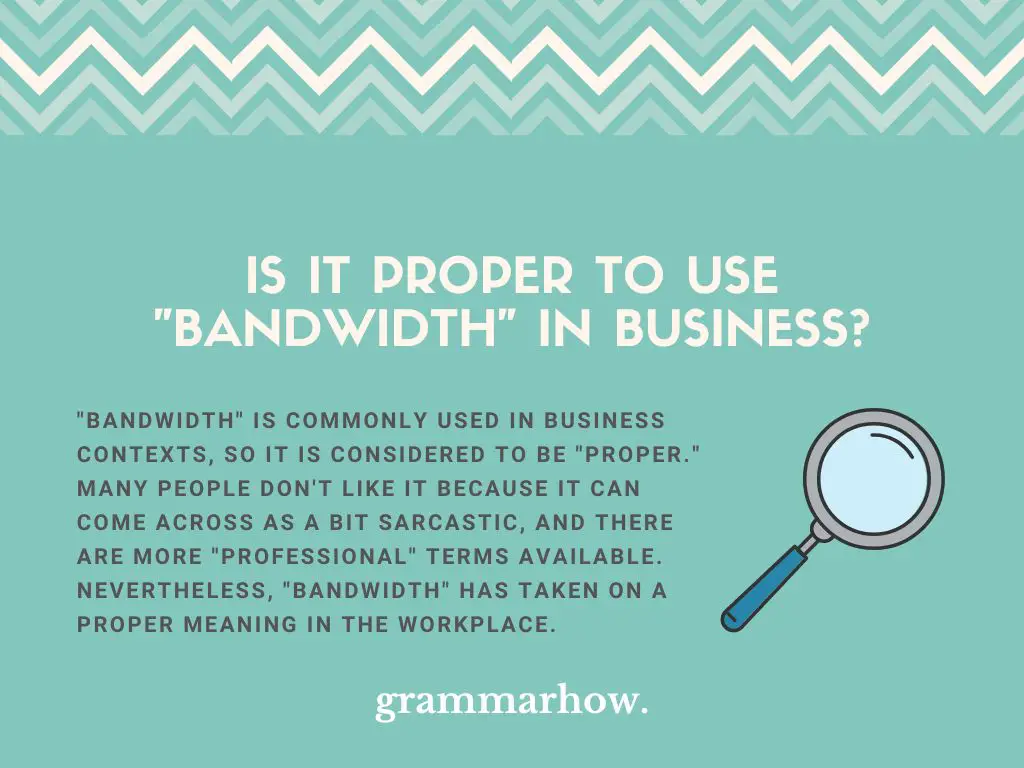Some people like to use “bandwidth” to talk about whether they have enough time to do something. In a business context, it can show that you don’t have enough time to get projects done before someone gives you anything new. This article will dive deep into its meaning for you.
Is It Proper to Use “Bandwidth” In Business?
“Bandwidth” is commonly used in business contexts, so it is considered to be “proper.” Many people don’t like it because it can come across as a bit sarcastic, and there are more “professional” terms available. Nevertheless, “bandwidth” has taken on a proper meaning in the workplace.

Work bandwidth relates to how much time you have at work. It gives someone an idea of whether you’re busy. That should let them know whether you’re able to start working on something new.
There is nothing wrong with using the word, but you have to make sure you know your audience before doing so.
Some people (especially in a computing company) will think that you’re saying you don’t have enough space or internet connection to take on new clients. This could be detrimental to business growth if you’re not careful.
What Does “Bandwidth” Mean?
“Bandwidth” is the measurement of the amount of time it takes for information to be sent between two computers. Originally, it relates to internet connectivity, but it has since taken on a meaning relating to whether someone has time to do new things.
The definition of “bandwidth,” according to The Cambridge Dictionary, is “the ability or time to deal with a situation, especially one that involves a large amount of information or a number of problems.”
From a business point of view, “bandwidth” is used to show that someone has run out of time. It is used when someone is swamped, meaning they are not physically able to take on any new jobs.
Since the idea originated from internet connectivity, it’s clear that “bandwidth” is most common in computing and technical fields. You’ll find that a lot of workers within these fields are going to use “bandwidth” to refer to what they can (and can’t) do.
Outside of these fields, you might be met with a bit of resistance when using “bandwidth.” People might find it a bit informal or colloquial. They might also misunderstand your meaning, which is why it is important to know your audience before using this.
How to Use “Bandwidth” In a Sentence
These examples will show you more about how to use “bandwidth” in a sentence:
- Do you have bandwidth to handle this problem right now? I know you’re busy, but I could really do with some help.
- I simply don’t have enough bandwidth at the moment. I’m completely swamped with these tasks, so I don’t think I can help you.
- He likes to talk about his bandwidth as if he’s the only busy person around here. It’s actually quite annoying.
- If you want to use anything online, you’ll have to make sure you’re not taking up too much bandwidth beforehand.
- My bandwidth is important to me. I can only work so hard before I end up burning myself out. I want you to remember that.
- Have you checked your bandwidth lately? It seems like you might be having some connection problems. You could work on that.
- His bandwidth is at the end of its range. He’s got no way of taking on any new clients at the minute.
“Bandwidth” means that someone doesn’t have time to take on new contracts or projects. It also relates to the internet connection you have with a server, and it can be used in either of these ways when referring to a business context.
7 Good Synonyms For “Bandwidth” In Business
There are plenty of good alternatives for “bandwidth” if you’re looking for a more professional feel with your words:
- Time
- Space
- Room
- Availability
- Ability
- Busy
- Allocation
Final Thoughts
“Bandwidth” is a great word you can use in a business context. It lets someone know how much time you have before taking on a project. It helps people around you to know whether you can take on new tasks. “Time” is a simpler replacement that may work formally too.

Martin holds a Master’s degree in Finance and International Business. He has six years of experience in professional communication with clients, executives, and colleagues. Furthermore, he has teaching experience from Aarhus University. Martin has been featured as an expert in communication and teaching on Forbes and Shopify. Read more about Martin here.
